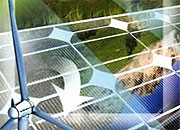The 2030 framework for climate and energy policies was proposed by the Commission in 2014 and is built on the experiences and lessons learnt from the 2020 climate and energy framework. On March 19, 2015 the leaders of EU also met to set out the first steps of an Energy Union, strengthening the commitment for affordable, secure and sustainable energy within the EU.
A central objective for the framework is to reduce EU domestic greenhouse gas emissions by at least 40 per cent below the 1990 level by 2030. In order to accomplish that, the framework points out that renewable energy is to play a key role in this transition. Therefore the Commission has proposed an objective of increasing the share of renewable energy to at least 27 per cent of the EU's energy consumption by 2030.
“I support and applaud both the Energy Union and the ambition to increase the renewable energy portion of the EU’s energy consumption to more than a quarter, an ambition that also was underlined on the meeting of March 19th”, said Anders Jansson, CEO of marine energy technology leader Minesto.
The initiative also claims that the ambition to invest in green technologies that cut emissions will also boost the economy, create jobs and strengthen Europe's competitiveness and create a Europe that is a highly energy-efficient, low carbon economy.
Minesto’s award winning and patented product Deep Green has now been producing electricity for almost two years in the waters off Northern Ireland, which is seen as a break-through for the entire renewable energy industry.
28 Февраля 2026 | суббота | 19:09


